Lei Feng Network (Search "Lei Feng Network" public number concerned) : Reprinted from CKDD public number.
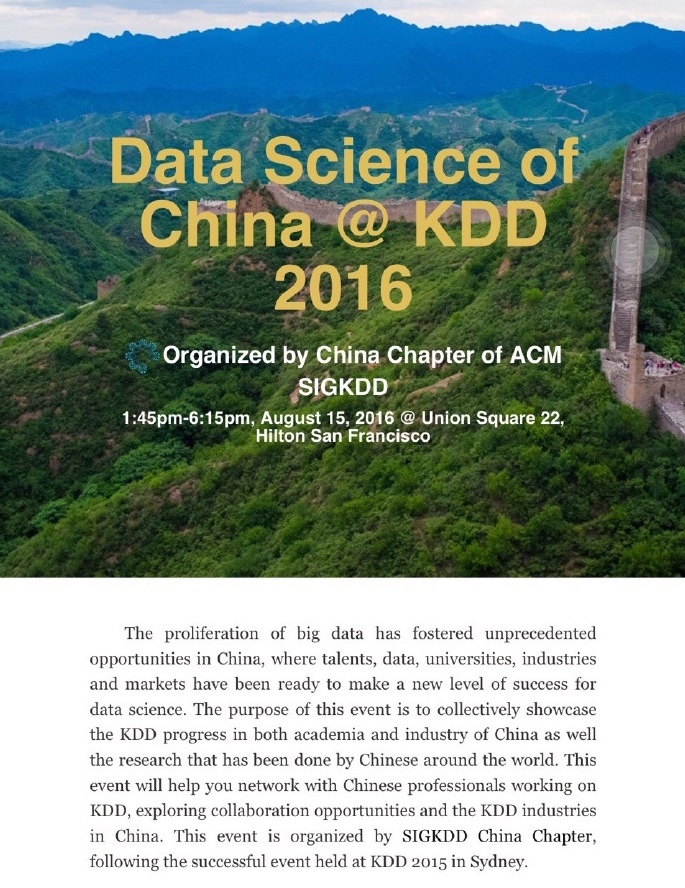
KDD Forum Data Science of China Presentation
On August 16 (Beijing time, August 15, local time), the 22nd International Data Mining Conference (KDD 2016) opened in San Francisco, USA. KDD (Knowledge Discovery and Data Mining) is the highest-level international conference in the world of data mining and big data. The number of participants this year reached 2,762. KDD China organizes the “Data Science of China†sub-forum on the agenda of the main meeting of the first day of the conference to focus on the progress of China in the field of data mining and Chinese research achievements in this field.
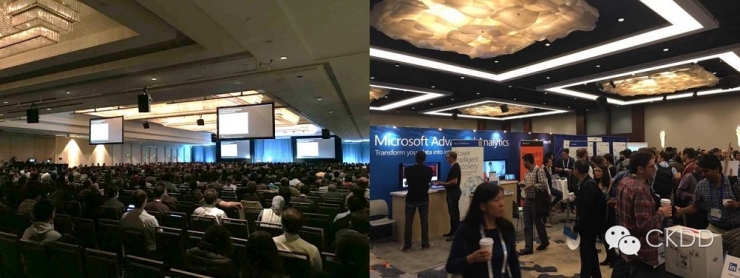
KDD 2016 Conference
The Data Science of China Forum was organized by China Chapter of ACM SIGKDD (KDD China). He was co-organized by KDD China's Secretary-General, Prof. Zheng Yu, Research Fellow of Microsoft Asia Research Institute, Dr. Shen Xiao, Vice President of KDD China, Senior Director of Baidu Finance, and Dr. Shipeng Yu, Linkedin Scientist.
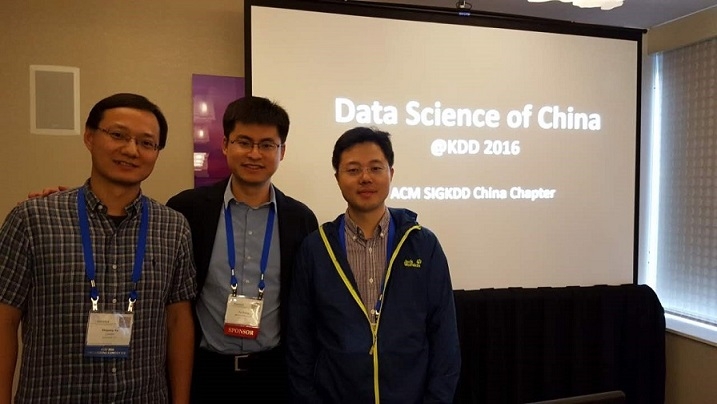
Forum Organizers: Dr. Shipeng Yu, Prof. Yu Zheng and Dr. Dou Shen (from left to right)
All six Chinese ACM Fellow attendees attended the conference. They were Prof. Philip Yu from the University of Illinois at Chicago (1997), Prof. Jiawei Han from the University of Illinois at Urbana-Champaign (2003), Prof. Chen Mingxian from Taiwan University (2006), Prof. Bing Liu (2015), University of Illinois at Chicago, Prof. Jian Pei (2015), Simon Fraser University, and Prof. Lin Zhiren (2015) of the University of Taiwan, where Professors Philip Yu, Jiawei Han, and Jian Pei conducted Wonderful report. The forum also invited seven distinguished Chinese professors, scientists and industrial elites from the field of data mining to jointly offer a forum for the most powerful data mining in Chinese history.
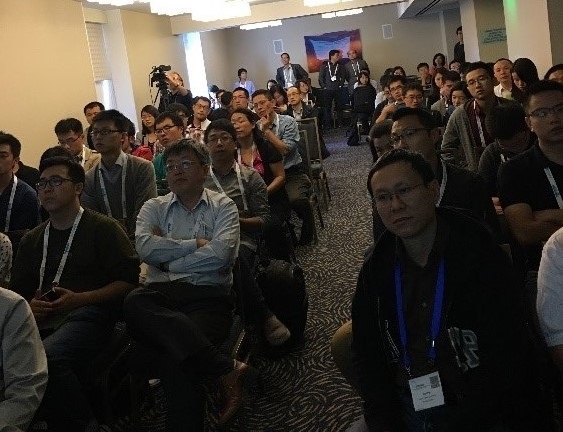
Live audience
At 1:45 pm local time, the forum began. Prof. Zheng Yu introduced the heavyweight guests and expressed sincere gratitude to the compatriots in this field. He then displayed and looked forward to the efforts made by Chinese in this field by counting the KDD article recruitment status and participant data for the past 7 years. From 2010 till now, the first authors who are Chinese recruiting articles account for about 45% of the total number of accepted articles, and they are on the rise. This year's proportion is as high as 56%. This proud figure reflects the Chinese people’s making in this area. The outstanding contribution, as shown below.
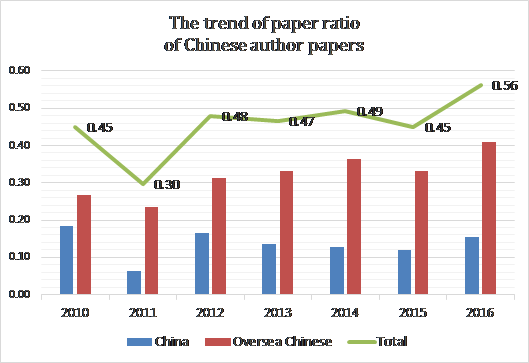
Over the past year, the number of Chinese first author articles accounted for the total number of
The number of participants from both sides of the strait increased from 102 in 13 years to 168 this year. As shown in the table below, the level of domestic research and the improvement of their capabilities are shown.

KDD's number of participants across the Taiwan Strait over the years
In addition, Professor Zheng also shared an interesting figure. As shown in the figure below, the number of Articles on the Research Track published on the two sides of the Taiwan Straits fell sharply, but the number of articles on Applied Data Science Track increased sharply. Whether this is the domestic weather vane for data mining technology, we need to further observe and verify.
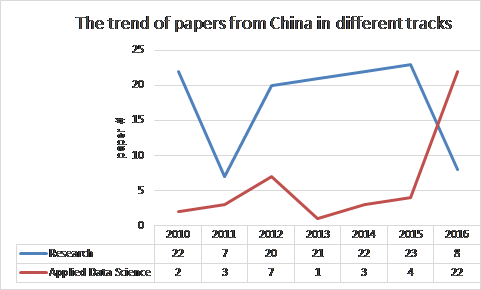
Domestic articles track number comparison chart
Subsequently, the forum was divided into two agendas. The first one was chaired by Prof. Bing Liu, chairman of SIGKDD. First, Dr. Jieping Ye, Vice President of Drip Research Institute shared the progress and research results of DDT travel in the field of data mining, and showed how big data and data mining technologies can better facilitate people's travel. Subsequently, Professor Zheng Yu introduced the application of data mining in the city - urban computing. City computing is a challenge to solve the city by continuously acquiring, integrating and analyzing multiple heterogeneous data in the city (such as environmental degradation, traffic The process of congestion, increased energy consumption, backward planning, etc.). Professor Zheng gave detailed introduction through some practical work. Prof. Hui Xiong from Rutgers University brought a report titled "People Analytics in Human Resources", introducing how to apply data mining technology to the field of human resource management. For example: Using data to evaluate and analyze talents, Auxiliary promotion assessment, recruitment and other processes. Prof. Jian Pei shared the construction methods of data science tools and platforms. He described in detail the cooperation with Huawei Technologies Co., Ltd., and explained how the platform manages Huawei's massive data and improved the service quality and customer satisfaction by mining these data. degree. Finally, Prof. Jiawei Han gave his latest research results, mining the structural content from the massive text corpora, that is, solving the traditional problems of segmentation and semantic analysis in the free language processing from the perspective of novel big data.
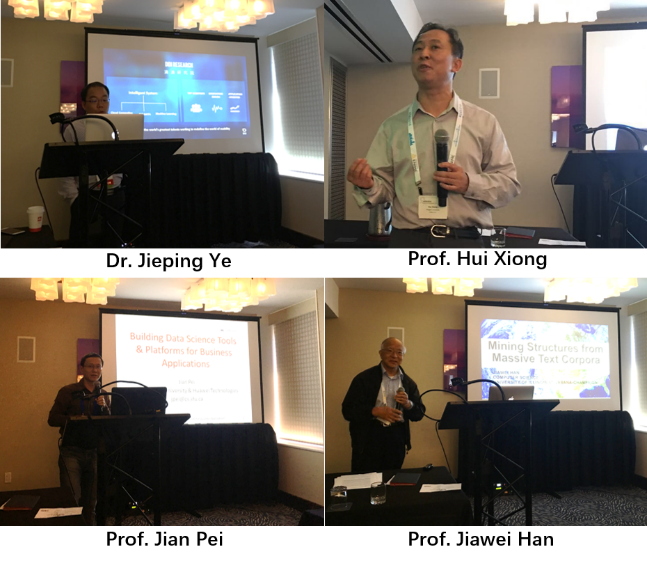
Forum Agenda One Reporter
Forum II was chaired by Dr. Shen Shaoshi. First, Dr. Cui Peng from Tsinghua University brought with him a review of the network representation in social network analysis and mining in the era of big data, and corresponding research on coping strategies. Dr. Tang Jie from Tsinghua University also introduced his research result-AMiner, an academic search system that provides research services by using data mining and social network analysis technology. It shows how to use academic information and data mining technology to help people discover better. Good academic resources: articles, authors, conferences, etc. Later, Professor Wei Wang from the University of California, Los Angeles conducted a report titled "Big Data Analytics in Bioinformatics Data" to fuse the biomedical information obtained from resources such as different sensors to understand the health of people and help doctors diagnosis.
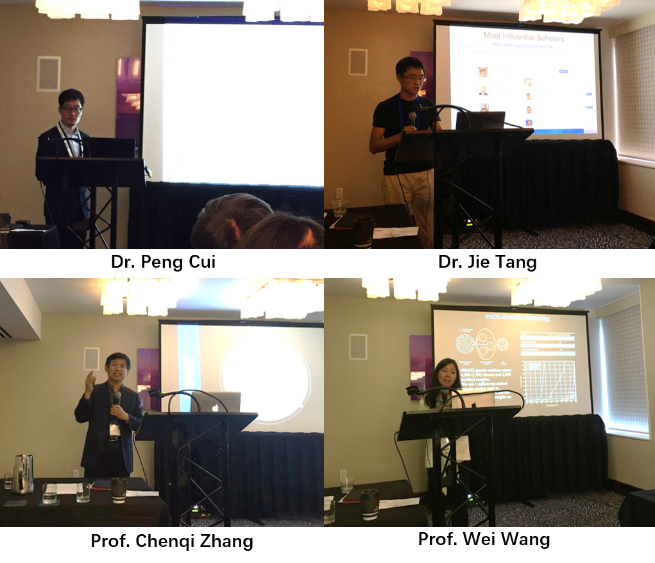
Forum Agenda 2 Reporter
Professor Philip Yu shared the latest research results of brain network mining. He modeled the human brain as a graph and hoped to help discover and understand the human brain's thinking pattern through big data and graph mining techniques. In addition, Prof. Philip Yu is also the winner of this year's KDD Conference Innovation Award (2016 ACM SIGKDD Innovation Award) in recognition of his outstanding contributions in the field of mining, fusion and anomaly discovery under big data. Finally, Professor Chenqi Zhang from the University of Technology Sydney presented his team's research in the field of graph processing and mining under big data.
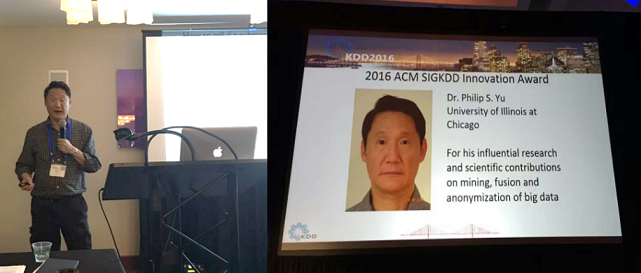
Prof. Philip Yu, winner of the KDD Conference Innovation Award
After the report was over, the organizers of the meeting took photos with the guests. At this point, the Data Science of China forum of KDD China organization has come to an end. This forum is the result of many Chinese people's hard work over the years. We hope that the convening of this forum will expand the influence of Chinese in the field of international data mining, promote research in the field of domestic data mining, and application and development in the industry.
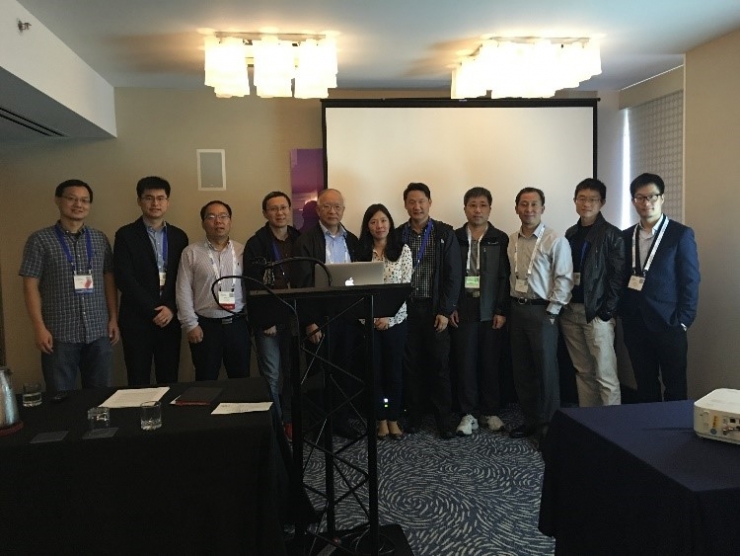
Organizers and guests photo